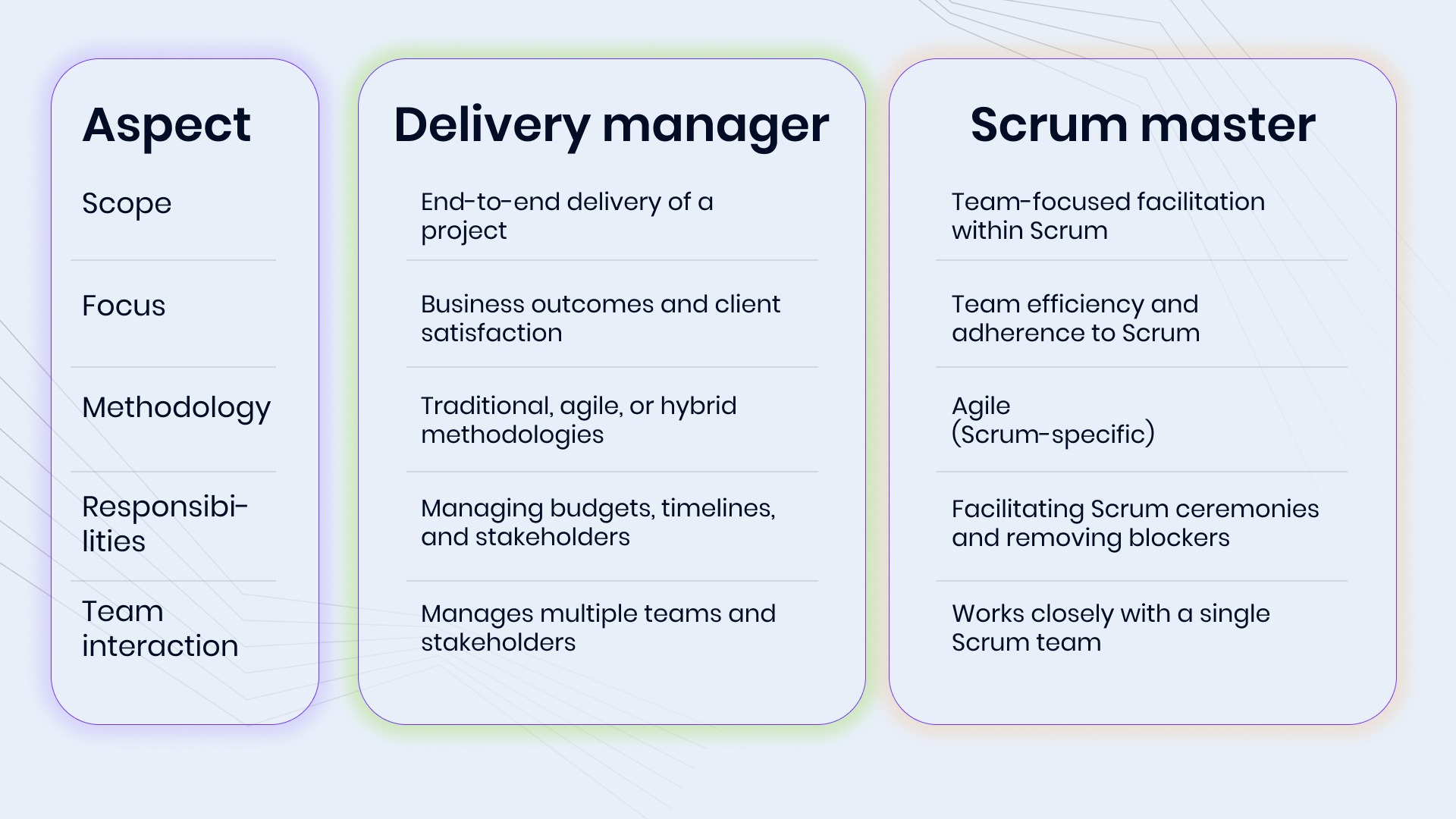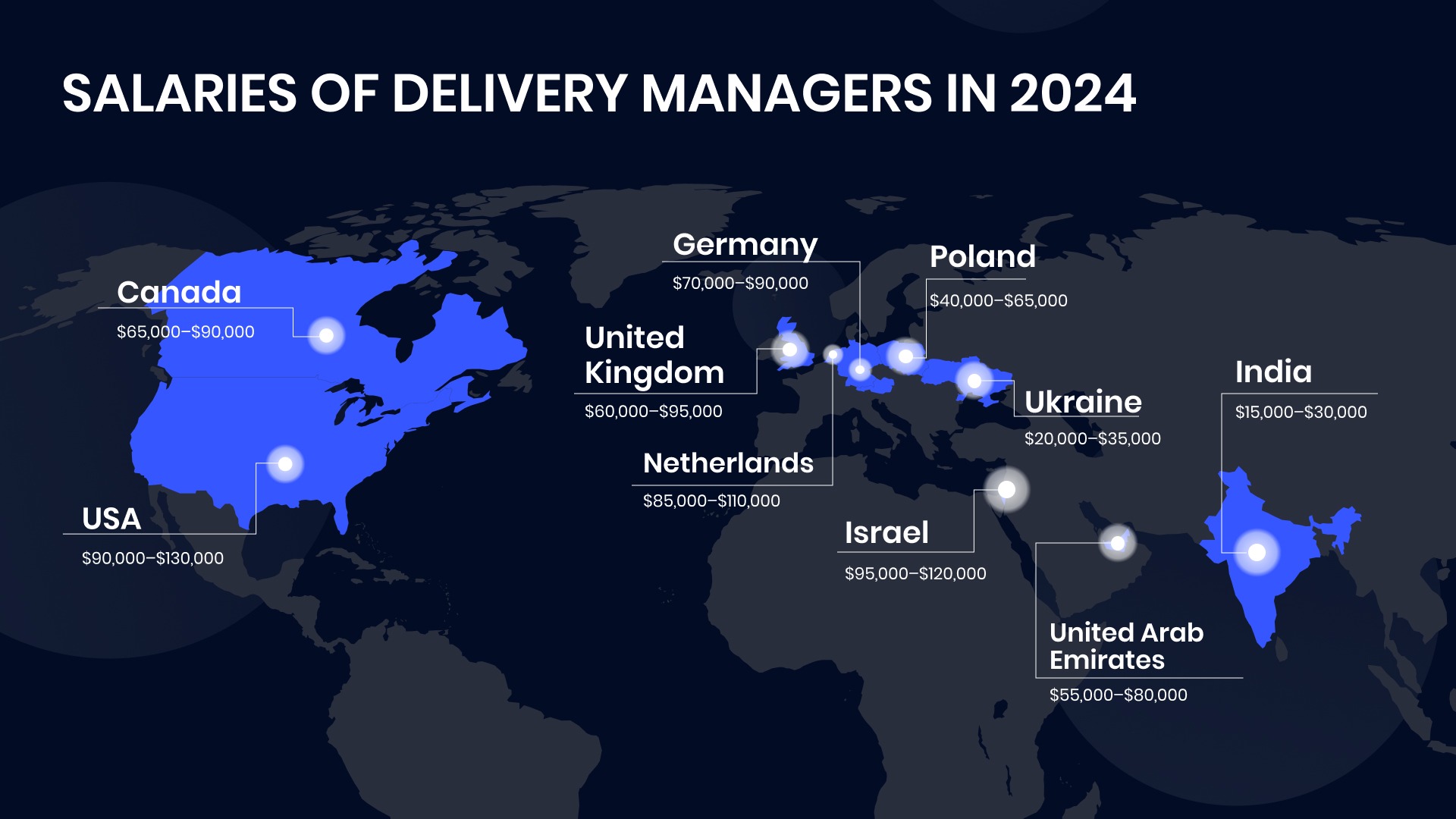
The demand for delivery managers is rising because IT and tech companies rely on them to improve efficiency and keep customers happy. The popularity of the role is driven by the digital transformation of most businesses and the rising popularity of cloud services and AI.
The demand for delivery managers has grown in remote and hybrid work settings, especially since the pandemic showed how important smooth service delivery is. This trend is set to continue as businesses focus on scaling, better customer experiences, and staying competitive.
The definition of a service delivery manager
A delivery manager is a relatively new role in IT. It emerged in the 1990s alongside the rise of IT service management and frameworks like the Information Technology Infrastructure Library. IT services became more complex and client-focused, so companies needed a specialized role to ensure services were delivered and consistently aligned with business goals and quality standards. Today, delivery managers act as a bridge between the client and the delivery team, making sure that projects are completed on time, within budget, and according to agreed-upon service levels.
What is the difference between a delivery manager and a Scrum master?
A Delivery manager is essential for large-scale projects with multiple stakeholders, complex deliverables, and significant resource management needs. A Scrum master is ideal for teams operating within a Scrum framework, focusing on agile practices and team empowerment. In some companies, the roles might overlap or be blended, but their core focus areas remain distinct.

Day-to-day tasks of a service delivery manager
A delivery manager keeps IT services running while meeting client needs. Their work requires a mix of leadership, problem-solving, and technical understanding. Here’s a breakdown of their daily tasks:
1. Monitor service-level performance
SLAs, or service-level agreements, are promises to the client about service quality, like ensuring 99.9% system uptime or responding to issues within a set timeframe. The delivery manager checks if these promises are met every day. For example, if a client’s website goes down, the SDM ensures the team fixes it within the agreed time and documents what happened.
2. IT teams and clients coordination to address service-related issues
The SDM acts as a problem solver when issues come up. If a client reports slow software performance, the SDM works with developers and support teams to identify the cause—such as a server overload—and ensures a quick fix. At the same time, they keep the client informed about progress.
3. Allocate resources and manage budgets
The SDM decides how to use available resources, such as team members, tools, and money, to meet project goals. For example, if a project needs more developers during a critical phase, the SDM shifts team members from less urgent tasks to prioritize the client’s needs, all while staying within budget.
4. Reporting and creating plans for improvement
Every day, the SDM tracks metrics like response times, system uptime, or client satisfaction scores. They analyze this data and propose solutions if they notice delays or recurring issues. For instance, if many clients report similar software bugs, the SDM might suggest adding a dedicated quality assurance step before releases.
5. A liaison between the client and the internal team
The SDM ensures both sides understand each other. If the client requests a feature that would take longer than expected, the SDM explains the reasons, offers realistic timelines, and ensures the internal team understands the client’s priorities. This avoids misunderstandings and keeps the project on track.
6. Identifying risks
The SDM looks for anything that might delay or disrupt a project, like team shortages, technical failures, or client budget cuts. For example, if there’s a risk of a critical server going offline due to high traffic, the SDM ensures backup systems are ready to avoid downtime.
Does your company need an SDM?
To know if you need a delivery manager, look at the complexity of your operations and your service management needs. You will benefit from a skilled delivery manager in these cases:
- You have complex projects with multiple stakeholders
- SLAs are critical for your business
- You require service continuity
- You have large-scale operations or expanding business
- You have recurring issues or dissatisfied clients
- You need better accountability
What skills should a delivery manager have?
Technical expertise → Understanding IT systems, software development, and infrastructure.
Project management → Ability to manage timelines, budgets, and resources.
Communication and collaboration → Strong client management and teamwork skills.
Problem-solving → Quick thinking to resolve service issues.
Leadership → Motivating teams and ensuring alignment with business goals.
ITSM/ITIL knowledge → Familiarity with frameworks to maintain service quality.
Education → A bachelor’s degree in IT, computer science, or business management is common.
Certifications → ITIL, PMP (Project Management Professional), or Agile certifications are highly valued.
Experience → Most delivery managers have 5+ years of experience in IT project management, customer support, or service management roles.
Average salaries of delivery managers in different countries
Being a skilled manager, combining technical skills with leadership, delivery managers are not cheap, especially in countries with well-developed economies. Here are annual average salaries of SDMs in US dollars in countries across Europe, Asia, and America:

If your location limits your talent pool to extremely expensive specialists, think of staff augmentation, an outsourcing strategy that will help you save up to 60% on direct labor costs without compromising the quality of IT services you need.
« Back to Glossary Index
